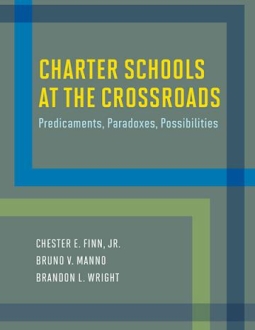Over the past quarter-century, charter schools have gone from an upstart education experiment to a prominent, promising, and disruptive innovation in K–12 education. Indeed, few observers present at the creation of the first charter schools could have predicted how rapidly this movement would spread or how thoroughly it would come to dominate the education-reform agenda. In Charter Schools at the Crossroads, authors Chester E. Finn, Jr., Bruno V. Manno, and Brandon L. Wright take stock of what chartering has (and hasn’t) accomplished thus far, how to address its present challenges, and what an ambitious and boldly different course for the next twenty-five years would look like.
From the role of philanthropy to the rise of no-excuses charter schools, they frankly examine the positive and negative consequences of policies and programs, and push sector leaders to do more, do better, and do it differently. They counter the often-oversimplified narrative of the movement’s origins, showing how multiple agendas and intentions led to a cacophony of results. And they address chartering’s many current dilemmas, including the roles of authorizers and operators, challenges in facilities and funding, and the balance between freedom and regulation. Informative and provocative, this book shows the tremendous work accomplished by the charter sector thus far—and how much still remains to be done.
Charter Schools at the Crossroads: Predicaments, Paradoxes, Possibilities is published by Harvard Education Press and is available for purchase on its website or Amazon.
Timeline of Charter School History
Scroll left and right through significant events.






